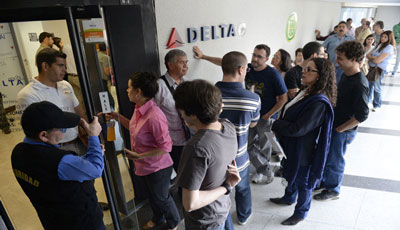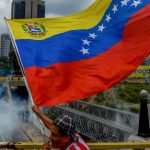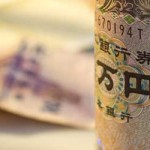Profits Vanish in Venezuela After Currency Devaluation

Brink’s, the armored car company, could see about $400 million in revenue disappear this year from its operations in this country. Procter & Gamble announced a write-down of $275 million on its Venezuela business. American Airlines and Delta Air Lines are slashing their Venezuela flights.
Venezuela, once an apparent profit center for multinational companies, increasingly looks like a financial black hole.
Despite the nation’s socialist-minded government, large American and other foreign companies thrived here for years, benefiting from limited competition, brand-hungry consumers and close commercial ties with the United States. At the same time, Venezuela’s overvalued currency greatly inflated the dollar value of sales on companies’ books, lifting their bottom lines, at least on paper.
Now the country’s economic chaos is taking its toll, as currency restrictions and a major devaluation cause profits to evaporate.
The economic crisis in this major oil exporting nation has grown since the longtime president, Hugo Chávez, died in March last year. The new president, Nicolás Maduro, has been unable to come up with a consistent set of policies to curb raging inflation and other ills, although there are signs that reforms may be on the horizon.
“It used to be a very profitable environment for them, but I think we’re hitting the wall,” said Carlos Tejera, the general manager of the Venezuela American Chamber of Commerce. “All indications are these multinationals are going to have to take a really cold, hard look at what’s going on here and have to make a decision, because this is unsustainable.”
The problems are rooted in the country’s currency, the bolívar.
Under standard accounting practices, American companies have long booked sales and profit on their Venezuelan operations using the primary exchange rate set by the government. For years, the currency has been overvalued, allowing multinational companies to post strong numbers.
The country’s high inflation — currently around 60 percent a year — has also meant that the prices in bolívares that companies charge for many goods and services have risen sharply. That has pushed up bolívar sales figures even higher and exacerbated the distortion when they are converted to dollars.
Such distortions can be seen in the financials of Femsa, the largest Coca-Cola bottler in Latin America. Last year, the company reported revenue in Venezuela of $2.4 billion, slightly greater than in Brazil, a much larger country. Yet sales volumes, which reflect the number of bottles or other units sold, were two to three times bigger in Brazil than in Venezuela, according to filings with the Securities and Exchange Commission.
“It’s all smoke and mirrors,” said Jonathan M. Rosenthal, co-founder of Newfoundland Capital Management, a hedge fund based in São Paolo, Brazil, that holds short positions in Brink’s and Femsa, betting that their stock will fall as the impact of Venezuela’s crisis on their business becomes clear. He said such accounting has filled the books of many companies with “phantom profits.”
Now companies are feeling the pain from a series of currency devaluations over the last year and a half.
First, the government changed the fixed exchange rate to 6.3 bolívares to the dollar, from 4.3. Then it created a three-tier exchange rate. The primary rate of 6.3 bolívares is largely intended for importing essential goods like food and medicine. Then there’s an intermediate rate of 10.5 bolívares to the dollar, available to companies invited to take part in government auctions, and another, created earlier this year, of 50 bolívares, which was intended to be open to all companies and individuals, although access has been fairly restricted. Both of those rates fluctuate slightly.
In the case of Brink’s, the company’s filings showed that Venezuelan revenues last year, measured at the government’s fixed exchange rate, were a robust $447 million. The company said that Venezuela made up a “significant component” of its overall operating profit last year.
But the rosy outlook changed in late March, when Brink’s started calculating its sales using the recently created exchange rate of about 50 bolívares to the dollar. In its quarterly report in April, the company said, “We do not expect Brink’s Venezuela to be a significant component of Brink’s consolidated revenue or operating profit in the last nine months of 2014.”
If the devalued exchange rate had been applied to last year’s Venezuela revenues, the company said, they would have shrunk by 88 percent and the operating profit for the entire company would have fallen by 31 percent.
Further complicating the picture, the Venezuelan government has not allowed companies to repatriate profits for the last five years.
Companies have ways of chipping away at the locked-up profits, including charging higher fees to Venezuelan subsidiaries for goods and services provided by the parent corporation. But many foreign companies are stuck holding vast troves of bolívares that shrink in value each time there is a devaluation.
Procter & Gamble said in April that it had the equivalent of about $900 million in cash in this country and that it was taking a $275 million write-down as a result of applying the government’s intermediate exchange rate to its Venezuelan balance sheet. Colgate-Palmolive wrote down $174 million, while Ford wrote down about $316 million.
“All the companies knew there would be a loss because everyone knew there wouldn’t be dollars” available at the fixed exchange rate, said an executive with an American company in Venezuela who spoke on the condition of anonymity. “We were trapped because the law here did not give you a way out.”
The currency controls have only tightened over the last year, making it increasingly difficult for companies to obtain the dollars they need to import goods, services, parts or other materials. The government has also failed to pay companies the hard currency it had promised them for imports bought on credit from suppliers, and in many cases suppliers are now refusing to ship more goods to Venezuela until they receive payment.
While international reserves have fallen, economists disagree on whether the government has enough dollars on hand to meet the demand for hard currency or whether it has restricted the supply of dollars as a matter of policy. Either way, the result is that economic production has slowed and shortages of all types are widespread.
Stores are often out of basic products such as dish soap or corn flour. DirecTV has stopped taking on new customers because it cannot get the dollars to import more dish antennas.
Without dollars, car companies cannot import the parts needed to assemble vehicles; Ford and Toyota were forced to temporarily close their factories. An industry trade group reported that in the first five months of this year automakers in Venezuela, including Chrysler, Ford, General Motors, Toyota and Mitsubishi, produced just 4,635 vehicles, down from 31,153 in the same period last year.
In yet another reflection of the currency restrictions, the government has refused to let airlines operating in Venezuela trade the bolívares they receive for ticket sales and other services here for dollars. The International Air Transport Association says that the airlines have more than $4 billion in revenues held up in the country, based on the government’s base exchange rate at the time the tickets were sold.
The result is that Venezuela is becoming increasingly cut off from the world.
Two airlines, Air Canada and Alitalia, have stopped flying to Venezuela (Air Canada said it had acted in response to violence around antigovernment protests), and others have sharply reduced service. American Airlines this month reduced its flights to Venezuela to 10 a week, down from 48. It eliminated direct flights from New York, Dallas-Fort Worth and San Juan, Puerto Rico, and flies only from Miami. American Airlines says that it is owed $750 million by the country’s government. Delta, which flies from Atlanta to Caracas, said that in August it would cut flights to just one a week, down from once daily.
There are suggestions, however, that the government may be edging toward reforms that could help spur the economy. Economic officials have said that they intend to move toward a unified exchange rate. And recently Jorge Giordani, an ideological hard-liner on economic policy, was pushed out of the government.
After that, the intermediate exchange rate weakened slightly, a sign, for some, that changes were coming, however slowly.
Source: NYT





























